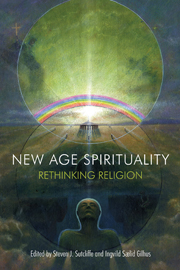Book contents
- Frontmatter
- Contents
- Introduction: “All mixed up” – thinking about religion in relation to New Age spiritualities
- Part I Rethinking New Age spiritualities
- 1 New Age, world religions and elementary forms
- 2 “All over the place”: the contribution of New Age to a spatial model of religion
- 3 Towards a new paradigm of constructing “religion”: New Age data and unbounded categories
- 4 On transgressing the secular: spiritualities of life, idealism, vitalism
- 5 Hiding in plain sight: the organizational forms of “unorganized religion”
- Part II Comparing New Age beliefs and practices
- Part III Putting new spiritual practices to work
- Conclusion: New Age spiritualities – “good to think” in the study of religion
- Contributors
- Further reading
- Bibliography
- Index
3 - Towards a new paradigm of constructing “religion”: New Age data and unbounded categories
from Part I - Rethinking New Age spiritualities
- Frontmatter
- Contents
- Introduction: “All mixed up” – thinking about religion in relation to New Age spiritualities
- Part I Rethinking New Age spiritualities
- 1 New Age, world religions and elementary forms
- 2 “All over the place”: the contribution of New Age to a spatial model of religion
- 3 Towards a new paradigm of constructing “religion”: New Age data and unbounded categories
- 4 On transgressing the secular: spiritualities of life, idealism, vitalism
- 5 Hiding in plain sight: the organizational forms of “unorganized religion”
- Part II Comparing New Age beliefs and practices
- Part III Putting new spiritual practices to work
- Conclusion: New Age spiritualities – “good to think” in the study of religion
- Contributors
- Further reading
- Bibliography
- Index
Summary
In this chapter, I will use the general theory of religion by Rodney Stark and William Sims Bainbridge from the 1980s as a starting point to discuss some challenges of constructing religion. Stark and Bainbridge presented their general theory of religion in several books and articles, the main ones being A Theory of Religion from 1987 (paperback edition 1996) and The Future of Religion (1985). The theory highlights some important issues concerning religion generally, but in particular focuses on new religious movements and the more unorganized environment popularly called “New Age” The issues it deals with are still very much up-to-date, and attempts to solve them have been classical in religious studies for decades. Triggered by some results in my research in the contemporary New Age environment, and in relation to more recent discussions about how to understand and deal with the problematic concept of religion, I would like to discuss their theory anew.
The aim of this chapter is thus to discuss selected parts of the Stark and Bainbridge theory of religion in relation to contemporary empirical studies and some recent theoretical discussions about “religion”, including the prototype theory of Benson Saler ([1993] 2000). In particular, I will use material from a local mapping project of religion and worldview that I have conducted in Dalarna since 2008.
- Type
- Chapter
- Information
- New Age SpiritualityRethinking Religion, pp. 50 - 65Publisher: Acumen PublishingPrint publication year: 2013



